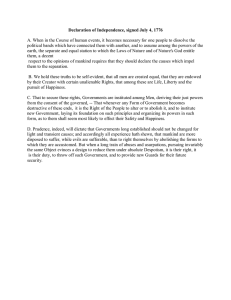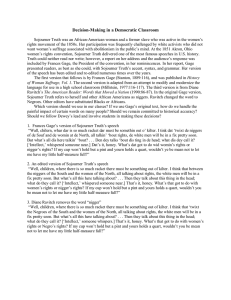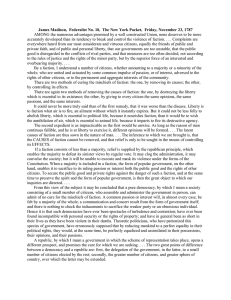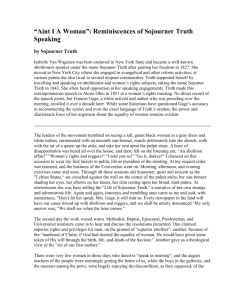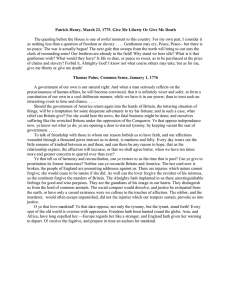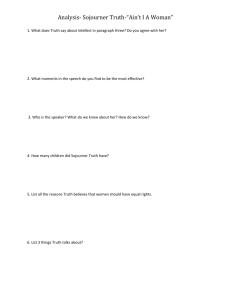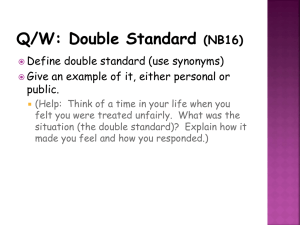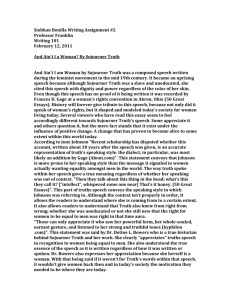Mayflower Compact 1620, Agreement Between the Settlers at New... IN THE NAME OF GOD, AMEN. We, whose names are... dread Sovereign Lord King James, by the Grace of God,...
advertisement
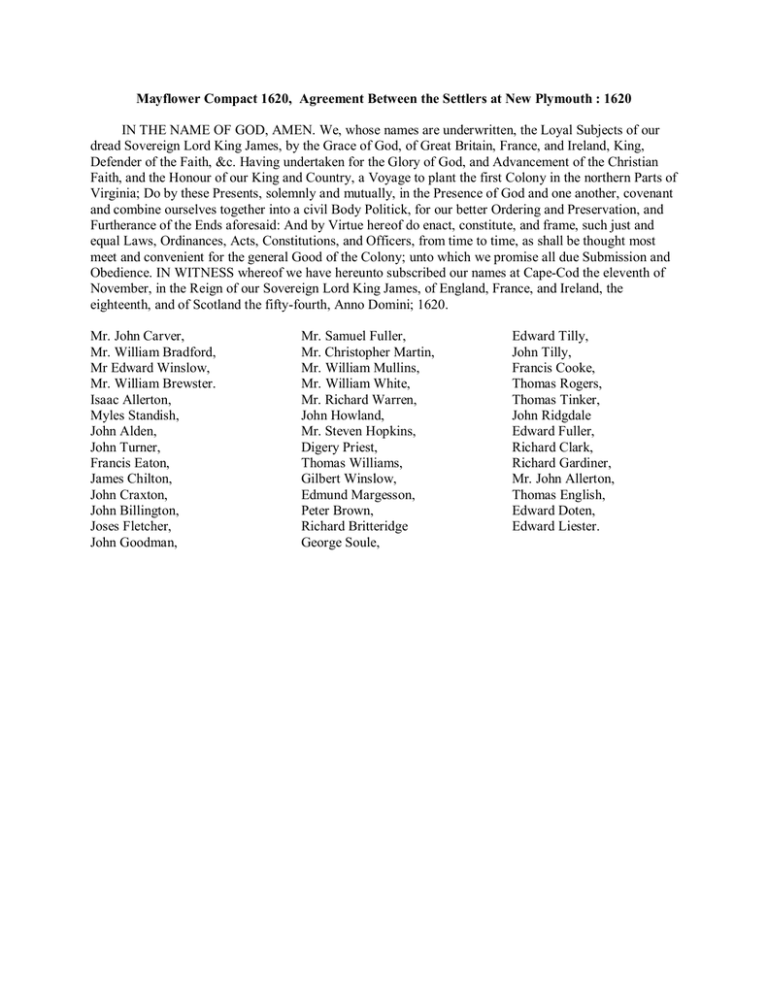
Mayflower Compact 1620, Agreement Between the Settlers at New Plymouth : 1620 IN THE NAME OF GOD, AMEN. We, whose names are underwritten, the Loyal Subjects of our dread Sovereign Lord King James, by the Grace of God, of Great Britain, France, and Ireland, King, Defender of the Faith, &c. Having undertaken for the Glory of God, and Advancement of the Christian Faith, and the Honour of our King and Country, a Voyage to plant the first Colony in the northern Parts of Virginia; Do by these Presents, solemnly and mutually, in the Presence of God and one another, covenant and combine ourselves together into a civil Body Politick, for our better Ordering and Preservation, and Furtherance of the Ends aforesaid: And by Virtue hereof do enact, constitute, and frame, such just and equal Laws, Ordinances, Acts, Constitutions, and Officers, from time to time, as shall be thought most meet and convenient for the general Good of the Colony; unto which we promise all due Submission and Obedience. IN WITNESS whereof we have hereunto subscribed our names at Cape-Cod the eleventh of November, in the Reign of our Sovereign Lord King James, of England, France, and Ireland, the eighteenth, and of Scotland the fifty-fourth, Anno Domini; 1620. Mr. John Carver, Mr. William Bradford, Mr Edward Winslow, Mr. William Brewster. Isaac Allerton, Myles Standish, John Alden, John Turner, Francis Eaton, James Chilton, John Craxton, John Billington, Joses Fletcher, John Goodman, Mr. Samuel Fuller, Mr. Christopher Martin, Mr. William Mullins, Mr. William White, Mr. Richard Warren, John Howland, Mr. Steven Hopkins, Digery Priest, Thomas Williams, Gilbert Winslow, Edmund Margesson, Peter Brown, Richard Britteridge George Soule, Edward Tilly, John Tilly, Francis Cooke, Thomas Rogers, Thomas Tinker, John Ridgdale Edward Fuller, Richard Clark, Richard Gardiner, Mr. John Allerton, Thomas English, Edward Doten, Edward Liester. Declaration of Independence, signed July 4, 1776 A. When in the Course of human events, it becomes necessary for one people to dissolve the political bands which have connected them with another, and to assume among the powers of the earth, the separate and equal station to which the Laws of Nature and of Nature's God entitle them, a decent respect to the opinions of mankind requires that they should declare the causes which impel them to the separation. B. We hold these truths to be self-evident, that all men are created equal, that they are endowed by their Creator with certain unalienable Rights, that among these are Life, Liberty and the pursuit of Happiness. C. That to secure these rights, Governments are instituted among Men, deriving their just powers from the consent of the governed, -- That whenever any Form of Government becomes destructive of these ends, it is the Right of the People to alter or to abolish it, and to institute new Government, laying its foundation on such principles and organizing its powers in such form, as to them shall seem most likely to effect their Safety and Happiness. D. Prudence, indeed, will dictate that Governments long established should not be changed for light and transient causes; and accordingly all experience hath shewn, that mankind are more disposed to suffer, while evils are sufferable, than to right themselves by abolishing the forms to which they are accustomed. But when a long train of abuses and usurpations, pursuing invariably the same Object evinces a design to reduce them under absolute Despotism, it is their right, it is their duty, to throw off such Government, and to provide new Guards for their future security. Oloudah Equiano Describes Being Kidnapped into Slavery Oloudah Equiano was born in Benin on the west coast of equatorial Africa in 1745, and was kidnapped and sold into slavery when he was eleven. While enslaved, he worked on a Virginia plantation as the servant for a British naval officer and for a Philadelphia merchant. After purchasing his freedom, he wrote his memoirs (Katz, 1971: 32-33) and became active in the anti-slavery movement. A selection from his memoir follows. The full text of The Interesting Narrative of the Life of Oloudah Equiano, or Gustavus Vasa, Written by Himself (London, 1789) is available on the web at docsouth.unc.edu. “The first object which assaulted my eyes when I arrived on the coast was the sea, and a slaveship, which was riding at anchor, and waiting for its cargo. These filled me with astonishment, which was soon converted into terror, which I am yet at a loss to describe. . . . When I was carried on board I was immediately handled, and tossed up, to see if I were sound, by some of the crew; and I was now persuaded that I had got into a world of bad spirits, and that they were going to kill me. . . . I was soon put down under the decks, and there I received such a salutation in my nostrils as I had never experienced in my life; so that with the loathsomeness of the stench, and the crying together, I became so sick and low that I was not able to eat, nor had I the least desire to taste anything. . . . but soon, to my grief, two of the white men offered me eatables; and on my refusing to eat, one of them held me fast by the hands...and tied my feet, while the other flogged me severely. . . . Amongst the poor chained men, I found some of my own nation, which in a small degree gave ease to my mind. I inquired of them what was to be done with us? They gave me to understand we were to be carried to these white people’s country to work for them. . . . The closeness of the place, and the heat of the climate, added to the number in the ship, which was so crowded that each had scarcely room to turn himself, almost suffocated us. . . . The shrieks of the women, and the groans of the dying, rendered the whole scene of horror almost inconceivable. . . . I was soon reduced so low here that it was thought necessary to keep me almost always on deck. . . . One day, when we had a smooth sea, . . . two of my wearied countrymen, who were chained together, preferring death to such a life of misery, somehow made it through the nettings, and jumped into the sea; immediately another quite dejected fellow . . . also followed their example; and I believe many more would very soon have done the same, if they had not been prevented by the ship’s crew, who were instantly alarmed. . . . Two of the wretches were drowned, but they got the other, and afterwards flogged him unmercifully, for thus attempting to prefer death to slavery. In this manner we continued to undergo more hardships than I can now relate; hardships which are inseparable from this accursed trade. . .” Decision-Making in a Democratic Classroom Sojourner Truth was an African-American woman and a former slave who was active in the women’s rights movement of the 1850s. Her participation was frequently challenged by white activists who did not want woman’s suffrage associated with abolitionism in the public’s mind. At the 1851 Akron, Ohio women’s rights convention, Sojourner Truth delivered one of the most famous speeches in U.S. history. Truth could neither read nor write; however, a report on her address and the audience’s response was included by Frances Gage, the President of the convention, in her reminiscences. In her report, Gage presented readers, as best as she could, with Sojourner Truth’s accent, syntax, and grammar. Her version of the speech has been edited and re-edited numerous times over the years. The first version that follows is by Frances Gage (Stanton, 1889:116), and was published in History of Woman Suffrage, Vol. 1. The second version is adapted from an attempt to modify and modernize the language for use in a high school classroom (Millstein, 1977:116-117). The third version is from Diane Ravitch’s The American Reader: Words that Moved a Nation (1990:86-87). In the original Gage version, Sojourner Truth refers to herself and other African Americans as niggers. Ravitch changed the word to Negroes. Other editors have substituted Blacks or Africans. Which version should we use in our classes? If we use Gage’s original text, how do we handle the painful impact of certain words on many people? Should we remain committed to historical accuracy? Should we follow Dewey’s lead and involve students in making these decisions? 1. Frances Gage’s version of Sojourner Truth’s speech “Wall, chilern, whar dar is so much racket dar must be somethin out o’ kilter. I tink dat ‘twixt de niggers of de Souf and de womin at de North, all talkin’ ‘bout rights, de white men will be in a fix pretty soon. But what’s all dis here talkin’ ‘bout? . . . Den dey talks ‘bout dis ting in de head; what dis dey call it? [‘Intellect,’ whispered someone near.] Dat’s it, honey. What’s dat got to do wid womin’s rights or nigger’s rights? If my cup won’t hold but a pint and yourn holds a quart, wouldn’t ye be mean not to let me have my little half-measure full?” 2. An edited version of Sojourner Truth’s speech “Well, children, where there is so much racket there must be something out of kilter. I think that between the niggers of the South and the women of the North, all talking about rights, the white men will be in a fix pretty soon. But what’s all this here talking about? . . . Then they talk about this thing in the head; what do they call it? [‘Intellect,’ whispered someone near.] That’s it, honey. What’s that got to do with women’s rights or nigger’s rights? If my cup won’t hold but a pint and yours holds a quart, wouldn’t you be mean not to let me have my little half-measure full?” 3. Diane Ravitch removes the word “nigger” “Well, children, where there is so much racket there must be something out of kilter. I think that ‘twixt the Negroes of the South and the women of the North, all talking about rights, the white men will be in a fix pretty soon. But what’s all this here talking about? . . . Then they talk about this thing in the head; what do they call it? [‘Intellect,’ someone whispers.] That’s it, honey. What’s that got to do with women’s rights or Negro’s rights? If my cup won’t hold but a pint and yours holds a quart, wouldn’t you be mean not to let me have my little half-measure full?” Supreme Court Justice William Brennan (The New York Times, October 13, 1985, p. 36) “We current Justices read the Constitution in the only way that we can: as 20th century Americans. We look to the history of the time of framing and to the intervening history of interpretation. But the ultimate question must be, what do the words of the text mean in our time? For the genius of the Constitution rests not in any static meaning it might have had in a world that is dead and gone, but in the adaptability of its great principles to cope with current problems and current needs.”
